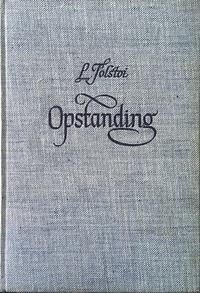Take a photo of a barcode or cover
I finished this book while watching people loot and burn the city of Baltimore on social media, which feels strangely appropriate.
Resurrection is a tale about Nekhlyudov, a rich young man who, due to a strange series of circumstances, is introduced to the sordid world of the Russian penal system. Tolstoy initially presents what appears to be a tale of redemptive love, but in reality it's a bit of a bait and switch. Instead, he uses the main romantic thread as an excuse to have his rich, educated narrator explore everything from the courts to the Senate to the fetid state of Russia's prisons at the end of the 19th century.
His criticisms are spot on — not just about the unjust conditions that sowed the seeds of the Bolshevik revolution — but about systems of penal justice altogether. I don't know if I follow Nekhlyudov's logic to his ultimate conclusion — that no man may judge another and that we would be better leaving justice to the province of heaven — but I agree that institutionalization has a corrosive effect on society that is ultimately worse than the sins being punished.
When you look at the streets of Baltimore, where as many as 1 in 4 youths in affected neighborhoods have spent time in jail, the connections are easy and apt.
This is not to say that he has nothing to say about love, which is how the book initially presents itself.
Right on. Perhaps the problem I have with the love story is that Nekhlyudov seems to be pursuing the love interest Maslova out of an inflated sense of moral obligation. He has affection for her, sure, built on a foundation of virginal love from his childhood. But from the beginning of the book, his motivation is an uncomfortable combination of guilt and self-satisfaction with the sacrifice he is willing to make for honor and perceived morality. Is he really acting in a moral way if he is doing what he is doing for praise and plaudits from his contemporaries?
The message about prisons and the morality of institutional punishment is really what I will wind up walking away from this one thinking about. It's a wonderful bit of social commentary, but it doesn't have that universal punch of a War and Peace.
Resurrection is a tale about Nekhlyudov, a rich young man who, due to a strange series of circumstances, is introduced to the sordid world of the Russian penal system. Tolstoy initially presents what appears to be a tale of redemptive love, but in reality it's a bit of a bait and switch. Instead, he uses the main romantic thread as an excuse to have his rich, educated narrator explore everything from the courts to the Senate to the fetid state of Russia's prisons at the end of the 19th century.
His criticisms are spot on — not just about the unjust conditions that sowed the seeds of the Bolshevik revolution — but about systems of penal justice altogether. I don't know if I follow Nekhlyudov's logic to his ultimate conclusion — that no man may judge another and that we would be better leaving justice to the province of heaven — but I agree that institutionalization has a corrosive effect on society that is ultimately worse than the sins being punished.
When you look at the streets of Baltimore, where as many as 1 in 4 youths in affected neighborhoods have spent time in jail, the connections are easy and apt.
This is not to say that he has nothing to say about love, which is how the book initially presents itself.
“The whole trouble lies in that people think that there are conditions excluding the necessity of love in their intercourse with man, but such conditions do not exist. Things may be treated without love; one may chop wood, make bricks, forge iron without love, but one can no more deal with people without love than one can handle bees without care.”
Right on. Perhaps the problem I have with the love story is that Nekhlyudov seems to be pursuing the love interest Maslova out of an inflated sense of moral obligation. He has affection for her, sure, built on a foundation of virginal love from his childhood. But from the beginning of the book, his motivation is an uncomfortable combination of guilt and self-satisfaction with the sacrifice he is willing to make for honor and perceived morality. Is he really acting in a moral way if he is doing what he is doing for praise and plaudits from his contemporaries?
The message about prisons and the morality of institutional punishment is really what I will wind up walking away from this one thinking about. It's a wonderful bit of social commentary, but it doesn't have that universal punch of a War and Peace.
Hm. I enjoyed this book, but I was disappointed with the ending. I really appreciated the way the main character struggles with really important questions about life and justice, but the dramatic title led me to expect a little more "umph" than I actually experienced.
emotional
informative
reflective
slow-paced
Plot or Character Driven:
Character
Strong character development:
Yes
Loveable characters:
Complicated
Apasionada reflexión sobre la injusticia, las desigualdades, la opresión y el maltrato y sinsentido de las cárceles.
Placer de la escritura de Tolstoi.
Placer de la escritura de Tolstoi.
dark
emotional
inspiring
reflective
medium-paced
Plot or Character Driven:
N/A
Strong character development:
N/A
Loveable characters:
N/A
Diverse cast of characters:
N/A
Flaws of characters a main focus:
N/A
korektna knjiga
Tolstoy is a magician. Somehow, he can write large works (although Resurrection isn't nearly as lengthy as Anna Karenina or War & Peace) and yet make the book a page turner. There is such a pace and ferocity that exists in his works that the size of the work becomes a non-player in the decision to read his works or not.
Furthermore, without getting too much in to spoilers here, Tolstoy also has this trick that I've experienced in Master and Man, War & Peace, and Anna Karenina in that he can write an episode in each of those works that stick out to me for the rest of my life. In Resurrection it is when the prisoners who are to be exiled to Siberia are taken from the prison in Moscow and loaded onto the Nizhni Line Train. The detail and description and tragedy of this episode is worth the read alone.
Doing a bit a research on Resurrection lead me to find that it was the last novel Tolstoy wrote and his Christian-Anarchy philosophy is very much a large driver in the narrative. Being that it took him twenty years to write narrative prose between Anna Karenina and Resurrection and those twenty years were filled with Tolstoy expanding his Christian-Anarchism in his philosophy and by proxy his writings, it goes without saying that Tolstoy was trying to drive home the point that he had found the answer for just about everything. I'm afraid that some readers who are new to Tolstoy who read Resurrection and are not aware of his politics will see this novel as agit-prop. That may be the case but Tolstoy was an unbelievable storyteller and his genius in that realm should most definitely be not only respected but rejoiced in.
Furthermore, without getting too much in to spoilers here, Tolstoy also has this trick that I've experienced in Master and Man, War & Peace, and Anna Karenina in that he can write an episode in each of those works that stick out to me for the rest of my life. In Resurrection it is when the prisoners who are to be exiled to Siberia are taken from the prison in Moscow and loaded onto the Nizhni Line Train. The detail and description and tragedy of this episode is worth the read alone.
Doing a bit a research on Resurrection lead me to find that it was the last novel Tolstoy wrote and his Christian-Anarchy philosophy is very much a large driver in the narrative. Being that it took him twenty years to write narrative prose between Anna Karenina and Resurrection and those twenty years were filled with Tolstoy expanding his Christian-Anarchism in his philosophy and by proxy his writings, it goes without saying that Tolstoy was trying to drive home the point that he had found the answer for just about everything. I'm afraid that some readers who are new to Tolstoy who read Resurrection and are not aware of his politics will see this novel as agit-prop. That may be the case but Tolstoy was an unbelievable storyteller and his genius in that realm should most definitely be not only respected but rejoiced in.
adventurous
dark
informative
sad
slow-paced
Plot or Character Driven:
Character
Strong character development:
Yes
Loveable characters:
No
Diverse cast of characters:
Yes
Flaws of characters a main focus:
Yes
Not terrible, but not engaging either
you are telling ME. THAT I SAT THROUGH HUNDREDS OF PAGES OF SOLILOQUIY ON THE JUSTICE SYSTEM (albeit well written and thought provoking and incredibly relevant hundreds of years later) FOR IT ALL TO END IN SOME BIBLE THUMPING???? no. this book should have ended around the 300 page mark and it should have ended FAR differently.
but the first 300 or so were an exceptional reflection on the harm we inflict on one another, the illogic and evil of nearly any punitive system, and people’s inner desire to be better and save someone, something else in the world.
but the first 300 or so were an exceptional reflection on the harm we inflict on one another, the illogic and evil of nearly any punitive system, and people’s inner desire to be better and save someone, something else in the world.
The "love story" aspect of this book is amazing except for the conclusion.
Thankfully you don't read this book for the love story, you read it to understand Tolstoy's mind and how it evolved. This book is only autobiographical in the sense that the protagonist went through the same sort of spiritual change that Tolstoy did.
I would recommend this book to anyone who is a self proclaimed proponent of "an eye for an eye". This book makes it clear why harsh punishments (really punishments of any sort) are not the answer to society's woe no matter how much they seem to be.
It's written from a Christian standpoint but the message will still be as strong to someone who is Muslim, Jewish, Agnostic, etc. even strictly non-spiritual atheists.
Thankfully you don't read this book for the love story, you read it to understand Tolstoy's mind and how it evolved. This book is only autobiographical in the sense that the protagonist went through the same sort of spiritual change that Tolstoy did.
I would recommend this book to anyone who is a self proclaimed proponent of "an eye for an eye". This book makes it clear why harsh punishments (really punishments of any sort) are not the answer to society's woe no matter how much they seem to be.
It's written from a Christian standpoint but the message will still be as strong to someone who is Muslim, Jewish, Agnostic, etc. even strictly non-spiritual atheists.






